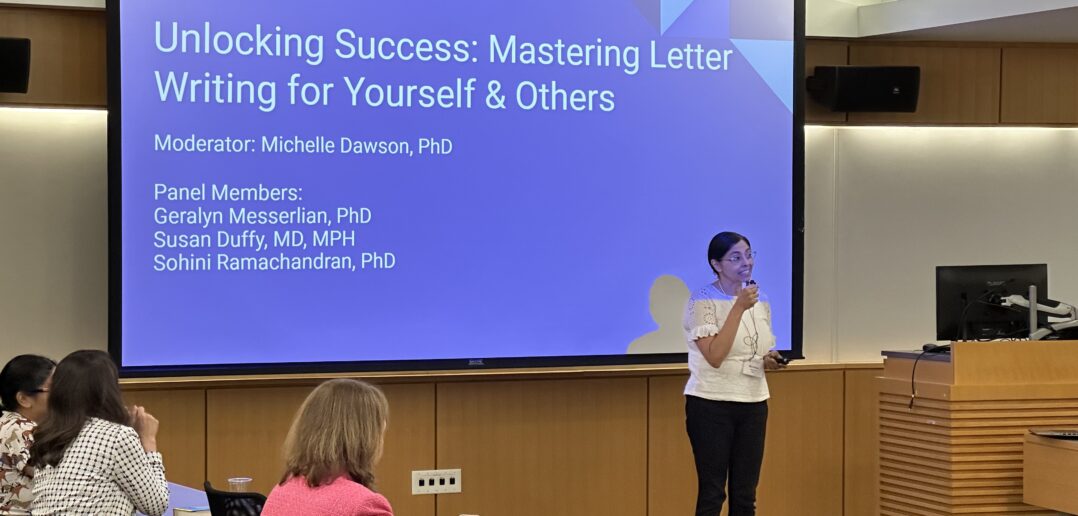The Office of Women in Medicine and Science celebrates the legacy and future of women in biomedical sciences at 20th annual conference.
During the opening discussion of this year’s Office of Women in Medicine (OWIMS) annual conference, “Reflecting on Our Legacy and Embracing the Future,” Michele Cyr, MD, senior associate dean for academic affairs, and Katherine M. Sharkey, MD, PhD, associate dean for gender equity, acknowledged the important reality facing women in science: great strides have been made in gender equity in the workforce, but there is still much work to be done.
Sharkey and Cyr opened the event with a discussion titled “Looking Back and Looking Forward: 20 Years of Women in Medicine and Science at Brown.” They covered the history of OWIMS at Brown, beginning in 1986 with the Association of Women Medical Faculty, through a variety of milestones, like the establishment of the Office of Women in Medicine in 1991, the group’s first Professional Development Conference in 2005, and the completion of a major faculty survey in 2013.
Sharkey and Cyr also shared data on the number of women within the Medical School, showing that women outnumber men serving as house staff by 60 percent to 40 percent. However, this ratio is reversed when looking at full-time faculty with men in the majority, though those numbers have been slowly converging. The number of full professors show a major disparity between men and women, with close to 200 men and just under 80 women. Part of the roadmap to address these disparities was derived from the previous faculty survey and its recommendations, which included convening a roundtable of senior female professors to learn how to improve the work climate and the inclusion of junior faculty on high-profile committees.
Other developments in the pipeline for OWIMS include the launch of the Clinical Researcher and Caregiver Lifeline grant program in the coming year, and the Dr. Marlene Cuititar Women Supporting Women award, in honor of the late Marlene Cutitar ’83 MD’86 RES’92, whom Sharkey referred to as a “giant” at the Medical School. The late Mary Lekas, MD, DSc, first woman to be a professor of clinical otolaryngology at the Medical School, also left a generous donation to OWIMS to fund a mentorship program. Cyr noted that both she and another trailblazer, the late Mary Arnold, MD, left funds to support faculty mentorship.
“The two Marys will be memorialized forever,” Cyr said.
The opening presentation segued into a discussion between Adaira Landry, MD, assistant professor of emergency medicine at Harvard Medical School, and Resa Lewiss ‘92, MD, professor of emergency medicine at the University of Alabama at Birmingham, and their new book, MicroSkills: Small Actions, Big Impact, before concluding with workshop sessions and a networking lunch for all attendees. The discussion, moderated by Almaz Dessie ’07 MD’11 F’17, director of Pediatric EM Diversity and Inclusion at The Warren Alpert Medical School, focused on the collaboration between Lewiss and Landry, the ins and outs of microskills and their utilization, and how certain microskills may be harder for women or people of color.
Lewiss said they avoided siloing a chapter specifically for diversity, equity, and inclusion, and instead opted to weave those themes throughout the text. She alluded to the differences between “main stage talks” and “side talks.”
“If we want to change things in the workplace in all industries, we really have to mainstage [DEI] and thread it throughout all of our curricula and not just include it in a separate chapter,” she said.
Lewiss and Landry emphasized that their book isn’t solely aimed at women, but when asked if there were any microskills that women physicians should improve, Landry referenced a chapter and microskill called “Pause Before You Accept an Opportunity.”
“This idea drives a lot of fear, because now you’re anxious and thinking, ‘If I say no, am I going to hurt my reputation? Am I going to miss out on something big that could have accelerated my career or am I going to disappoint someone else?’, so it drives a lot of us to say yes,” Landry said.
That desire can lead to an overwhelming personal and professional workload at the cost of one’s own development, but Landry said the idea is not to say “no” to everything. Instead, she emphasized the importance of leaning on a support group and asking questions, even if they may seem obvious, like deadlines, administrative support, and funding. She drew on her own experience taking on an enormous amount of administrative responsibilities while also raising two new children.
“Just pausing before you say ‘yes’ can be life-changing, truly,” Landry said.




